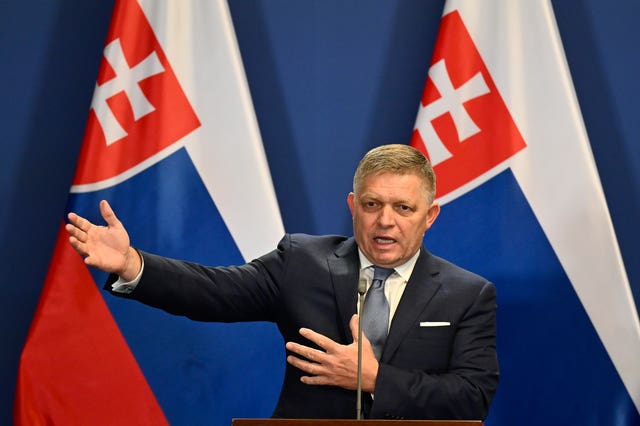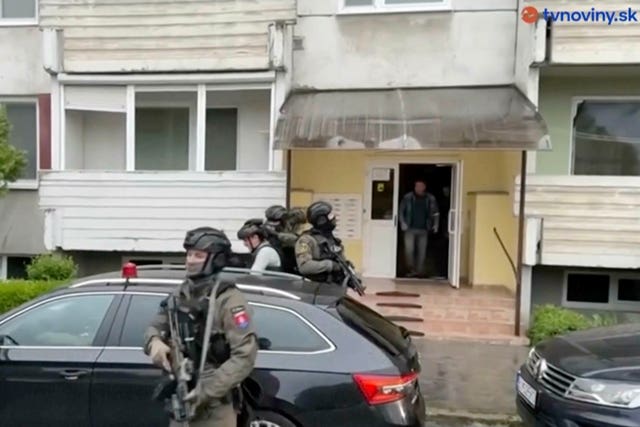Man accused of trying to kill Slovakia’s prime minister to remain behind bars
The order to detain the suspect came as Robert Fico was in a serious but stable condition after surviving multiple gunshot wounds.

The man accused of attempting to assassinate Slovakian Prime Minister Robert Fico has been ordered to remain behind bars.
Prosecutors sought an order from Slovakia’s Specialised Criminal Court to detain the suspect because of fear he could escape or carry out other crimes, a court spokesperson said.
The order came as the nation’s leader was in a serious but stable condition after surviving multiple gunshot wounds, officials said.
Prosecutors told police not to publicly identify his alleged would-be assassion or release other details about the case, but unconfirmed media reports said he was a 71-year-old retiree known as an amateur poet who may have once worked as a shopping centre security guard in the country’s south west.
Government authorities gave details that matched that description. They said the suspect did not belong to any political groups, though the attack itself was politically motivated.

The courthouse in Pezinok, a small town outside the capital, Bratislava, was guarded by police wearing helmets and balaclavas and carrying rifles. News media were not allowed in and reporters were kept behind a gate outside.
Surgery that took two hours on Friday to remove dead tissue from Mr Fico’s multiple gunshot wounds led to an optimistic outlook for his recovery, but he was not healthy enough to travel to a hospital in the capital, Bratislava, government ministers said outside University FD Roosevelt Hospital in Banska Bystric, where Mr Fico was taken by helicopter after the shooting.
“Several miracles have occurred … in the past few days, coming from the hands of the doctors, nurses and entire medical staff,” defence minister Robert Kalinak said. “I can’t find words of gratitude for the fact that we are steadily approaching that positive prognosis.”
Mr Fico, 59, was shot in the abdomen as he greeted supporters following a government meeting on Wednesday in the former coal mining town of Handlova, officials said. The suspect fired five rounds before being tackled to the ground and arrested.
The update on Mr Fico’s health was issued as the man accused of attempting to assassinate him made his first court appearance, according to Slovak state media.
Police took the suspect to his home in the town of Levice on Friday and seized a computer and some documents, Markiza, a Slovak television station reported. Police did not comment.
With police remaining largely silent about the case, it was not clear how the suspect came to possess a firearm.
Slovakia has strict rules on firearms and gun owners must have a good reason to possess one and are required to pass a test.
As a consequence, Slovakia has one of the lowest gun ownership rates in Europe. It was ranked 23rd out of 27 European Union countries with a gun ownership rate of 6.5 per 100 people, according to the Association of Accredited Public Policy Advocates to the EU.
World leaders have condemned the attack and offered support for Mr Fico and Slovakia.

Mr Fico has long been a divisive figure in Slovakia and beyond. His return to power last year on a pro-Russia, anti-American platform led to worries among fellow European Union and Nato members that he would abandon his country’s pro-Western course, particularly on Ukraine.
At the start of Russia’s full-scale invasion in February 2022, Slovakia was one of Ukraine’s staunchest supporters, but Mr Fico halted arms deliveries to Ukraine when he returned to power, his fourth time serving as prime minister.
Mr Fico’s government has also made efforts to overhaul public broadcasting – a move critics said would give the government full control of public television and radio. That, coupled with his plans to amend the penal code to eliminate a special anti-corruption prosecutor, have led opponents to worry that Mr Fico will lead Slovakia down a more autocratic path.
Thousands of demonstrators have repeatedly rallied in the capital and around the country of 5.4 million to protest against his policies.
Mr Fico said last month on Facebook that he believed rising tensions in the country could lead to the killing of politicians, and he blamed the media for fuelling tensions.
Before Mr Fico returned to power last year, many of his political and business associates were the focus of police investigations, and dozens have been charged.
His plan to overhaul the penal system would eliminate the office of the special prosecutor that deals with organised crime, corruption and extremism.
Despite nobody being named as temporary leader, there was nothing imminent that needed the premier’s attention and the government was operating as planned and moving forward with Mr Fico’s agenda, Mr Kalinak said.
Communication with Mr Fico was limited given his condition, Mr Kalinak said.
The next government session is planned for Wednesday and Mr Kalinak will be in charge, the Slovak government office said.





